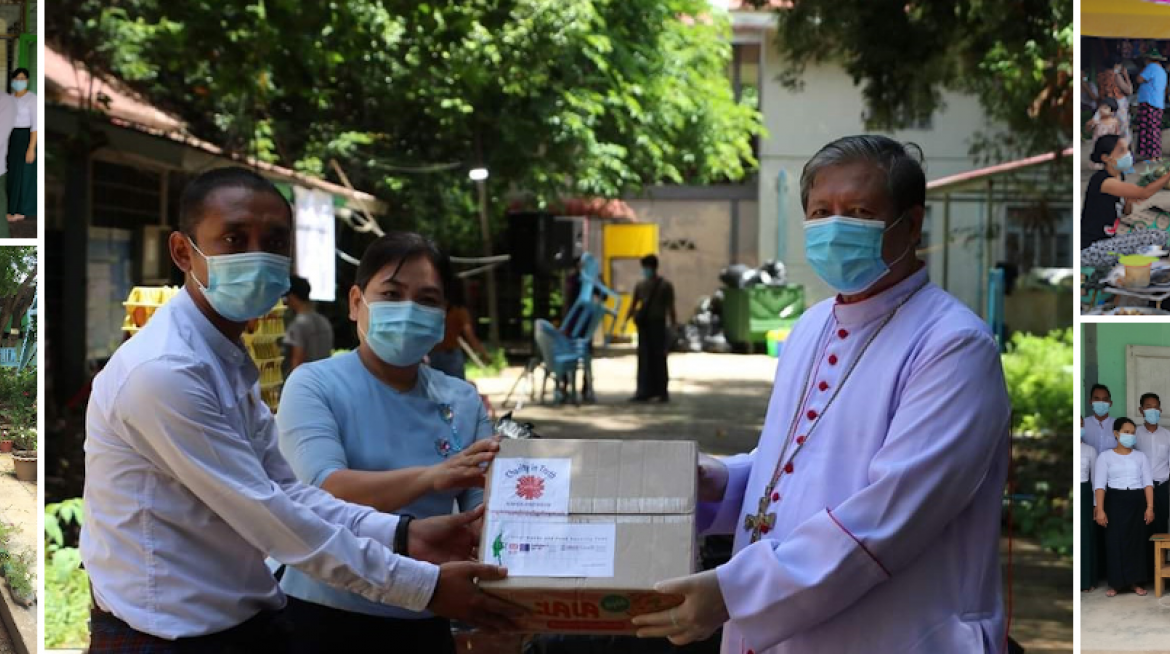
Throughout July, the fifth month since COVID-19 reached Myanmar, LIFT’s civil society strategic partners continued to work tirelessly to raise awareness about the disease and provide essential items such as food, personal protective equipment (PPE) and hygiene products to the most vulnerable people in Myanmar. At home and around the world, local organisations demonstrate their commitment, their reach and their results.
LIFT’s key civil society partners - the Land Core Group (LCG), Karuna Mission Social Services (KMSS), Network Activity Group (NAG) and Gender Equality Network (GEN) - here roundup some of the many ways they have improved the lives of women, orphans, elderly and marginalized people during the last month alone!
Land Core Group (LCG)
LCG’s COVID-19 response program, in partnership with local CSOs, provided support to 104,507 people, out of which 47 per cent were women. LCG supported community quarantine centres, high schools, rural health centres and local markets with PPEs, hygiene items, food and informational materials.
Karuna Mission Social Services (KMSS)
KMSS reached 51,173 beneficiaries from across the country with information on COVID-19 prevention and access to critical services, as well as ensuring they have the material supplies they need. Orphans and elderly people at care homes are among the 3,382 people who received critical hygiene supplies and services. Additionally, 150 healthcare workers at health facilities and communities received PPEs. In case of an emergency, 451 residents of six orphanages, three leprosy centres, two boarding houses, two HIV centres, a centre for people with disabilities, a quarantine centre and a clergy house will now have basic food items to support themselves.
Network Activity Group (NAG)
NAG’s video ‘Take Home Message for Quarantine Persons’ reached 41,107 people and 152 people shared it, improving access to information on prevention of COVID-19 in Myanmar. NAG also supported 20,080 marginalized people, including 48 per cent women, in camps and quarantine centres with PPEs and awareness-raising activities. Importantly, cash grants supported 731 vulnerable families and families with sick members isolated in camps.
Gender Equality Network (GEN)
GEN produced four videos to raise awareness about COVID-19 and its gender implications. Those include protection of rights of women and girls, psychological support and women’s place in the economy during the pandemic. Over 2,700 viewers saw the clips on Facebook and Youtube. In addition to working in the digital domain, GEN translated an advocacy brief and a poster about gender-based violence in four ethnic languages: Kachin, Poe-Kayin, S’gaw-Kayin, and Shan. GEN printed out over 85,000 informational materials and received a request for an additional batch from 36 CSOs and INGOs. In Rakhine, GEN delivered basic communication equipment, hygiene infrastructure and medical PPEs for over 12,000 people in 24 IDP camps, as well as townships in the State.
Going forward
COVID-19 has become a poignant reality for the foreseeable future but LIFT and its local civil society partners will be here to support the people of Myanmar. They will continue distributing essential food items to poor households and vulnerable people, including people with disabilities and leprosy, the elderly, and orphans. To make informed decisions on how to tackle the spread of the disease in the future, LIFT’s strategic partners are also co-researching the impacts of COVID-19 on the most vulnerable families and rural livelihoods in Myanmar.


